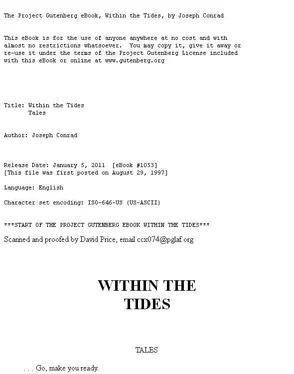Cloete sees all, the little drawers drawn out, and asks the coxswain to look well into them. . . There’s nothing, says the man. Cleaned out. Seems to have pulled out all he could lay his hands on and set fire to the lot. Mad—that’s what it is—went mad. And now he’s dead. You’ll have to break it to his wife. . .
“I feel as if I were going mad myself, says Cloete, suddenly, and the coxswain begs him for God’s sake to pull himself together, and drags him away from the cabin. They had to leave the body, and as it was they were just in time before a furious squall came on. Cloete is dragged into the life-boat and the coxswain tumbles in. Haul away on the grapnel, he shouts; the captain has shot himself. . .
“Cloete was like a dead man—didn’t care for anything. He let that Stafford pinch his arm twice without making a sign. Most of Westport was on the old pier to see the men out of the life-boat, and at first there was a sort of confused cheery uproar when she came alongside; but after the coxswain has shouted something the voices die out, and everybody is very quiet. As soon as Cloete has set foot on something firm he becomes himself again. The coxswain shakes hands with him: Poor woman, poor woman, I’d rather you had the job than I. . .
“Where’s the mate?” asks Cloete. He’s the last man who spoke to the master. . . Somebody ran along—the crew were being taken to the Mission Hall, where there was a fire and shake-downs ready for them—somebody ran along the pier and caught up with Stafford. . . Here! The owner’s agent wants you. . . Cloete tucks the fellow’s arm under his own and walks away with him to the left, where the fishing-harbour is. . . I suppose I haven’t misunderstood you. You wish me to look after you a bit, says he. The other hangs on him rather limp, but gives a nasty little laugh: You had better, he mumbles; but mind, no tricks; no tricks, Mr. Cloete; we are on land now.
“There’s a police office within fifty yards from here, says Cloete. He turns into a little public house, pushes Stafford along the passage. The landlord runs out of the bar. . . This is the mate of the ship on the rocks, Cloete explains; I wish you would take care of him a bit to-night. . . What’s the matter with him? asks the man. Stafford leans against the wall in the passage, looking ghastly. And Cloete says it’s nothing—done up, of course. . . I will be responsible for the expense; I am the owner’s agent. I’ll be round in an hour or two to see him.
And Cloete gets back to the hotel. The news had travelled there already, and the first thing he sees is George outside the door as white as a sheet waiting for him. Cloete just gives him a nod and they go in. Mrs. Harry stands at the head of the stairs, and, when she sees only these two coming up, flings her arms above her head and runs into her room. Nobody had dared tell her, but not seeing her husband was enough. Cloete hears an awful shriek. . . Go to her, he says to George.
“While he’s alone in the private parlour Cloete drinks a glass of brandy and thinks it all out. Then George comes in. . . The landlady’s with her, he says. And he begins to walk up and down the room, flinging his arms about and talking, disconnected like, his face set hard as Cloete has never seen it before. . . What must be, must be. Dead—only brother. Well, dead—his troubles over. But we are living, he says to Cloete; and I suppose, says he, glaring at him with hot, dry eyes, that you won’t forget to wire in the morning to your friend that we are coming in for certain. . .
“Meaning the patent-medicine fellow. . . Death is death and business is business, George goes on; and look—my hands are clean, he says, showing them to Cloete. Cloete thinks: He’s going crazy. He catches hold of him by the shoulders and begins to shake him: Damn you—if you had had the sense to know what to say to your brother, if you had had the spunk to speak to him at all, you moral creature you, he would be alive now, he shouts.
“At this George stares, then bursts out weeping with a great bellow. He throws himself on the couch, buries his face in a cushion, and howls like a kid. . . That’s better, thinks Cloete, and he leaves him, telling the landlord that he must go out, as he has some little business to attend to that night. The landlord’s wife, weeping herself, catches him on the stairs: Oh, sir, that poor lady will go out of her mind. . .
“Cloete shakes her off, thinking to himself: Oh no! She won’t. She will get over it. Nobody will go mad about this affair unless I do. It isn’t sorrow that makes people go mad, but worry.
“There Cloete was wrong. What affected Mrs. Harry was that her husband should take his own life, with her, as it were, looking on. She brooded over it so that in less than a year they had to put her into a Home. She was very, very quiet; just gentle melancholy. She lived for quite a long time.
“Well, Cloete splashes along in the wind and rain. Nobody in the streets—all the excitement over. The publican runs out to meet him in the passage and says to him: Not this way. He isn’t in his room. We couldn’t get him to go to bed nohow. He’s in the little parlour there. We’ve lighted him a fire. . . You have been giving him drinks too, says Cloete; I never said I would be responsible for drinks. How many? . . . Two, says the other. It’s all right. I don’t mind doing that much for a shipwrecked sailor. . . Cloete smiles his funny smile: Eh? Come. He paid for them. . . The publican just blinks. . . Gave you gold, didn’t he? Speak up! . . . What of that! cries the man. What are you after, anyway? He had the right change for his sovereign.
“Just so, says Cloete. He walks into the parlour, and there he sees our Stafford; hair all up on end, landlord’s shirt and pants on, bare feet in slippers, sitting by the fire. When he sees Cloete he casts his eyes down.
“You didn’t mean us ever to meet again, Mr. Cloete, Stafford says, demurely. . . That fellow, when he had the drink he wanted—he wasn’t a drunkard—would put on this sort of sly, modest air. . . But since the captain committed suicide, he says, I have been sitting here thinking it out. All sorts of things happen. Conspiracy to lose the ship—attempted murder—and this suicide. For if it was not suicide, Mr. Cloete, then I know of a victim of the most cruel, cold-blooded attempt at murder; somebody who has suffered a thousand deaths. And that makes the thousand pounds of which we spoke once a quite insignificant sum. Look how very convenient this suicide is. . .
“He looks up at Cloete then, who smiles at him and comes quite close to the table.
“You killed Harry Dunbar, he whispers. . . The fellow glares at him and shows his teeth: Of course I did! I had been in that cabin for an hour and a half like a rat in a trap. . . Shut up and left to drown in that wreck. Let flesh and blood judge. Of course I shot him! I thought it was you, you murdering scoundrel, come back to settle me. He opens the door flying and tumbles right down upon me; I had a revolver in my hand, and I shot him. I was crazy. Men have gone crazy for less.
“Cloete looks at him without flinching. Aha! That’s your story, is it? . . . And he shakes the table a little in his passion as he speaks. . . Now listen to mine. What’s this conspiracy? Who’s going to prove it? You were there to rob. You were rifling his cabin; he came upon you unawares with your hands in the drawer; and you shot him with his own revolver. You killed to steal—to steal! His brother and the clerks in the office know that he took sixty pounds with him to sea. Sixty pounds in gold in a canvas bag. He told me where they were. The coxswain of the life-boat can swear to it that the drawers were all empty. And you are such a fool that before you’re half an hour ashore you change a sovereign to pay for a drink. Listen to me. If you don’t turn up day after to-morrow at George Dunbar’s solicitors, to make the proper deposition as to the loss of the ship, I shall set the police on your track. Day after to-morrow. . .
Читать дальше












